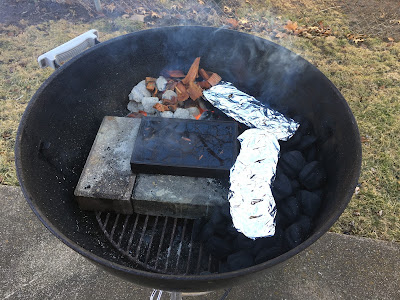Why I Don't Respect Electric Smokers: The Art & Science of BBQ
Spring is breaking here in Chicago. For me, that means one thing: BBQ season. Sure the pool is opening and days are getting longer...but during my winter hibernation (where I'm relegated to a propane grill), I drool about low-and-slow outdoor cooking!
I've a group of guy friends that trades stories of our adventures in BBQ. Some (who live at great distances) text photos. Some email questions to solicit advice for cooking an upcoming dinner. But the conversations I enjoy most are those through my backyard fence...or better yet...those around the grill with a few beers in hand.
BBQ is a science because of fundamental thermodynamic laws and chemical reactions. It's an art because of the tacit knowledge and craftsmanship required to tweak and massage the system as the variables change ever so slightly.
Traditionalist BBQ'ers are cavemen. We use low tech tools, fuels, and tricks to turn low quality cuts of meat into delicious meals. Two of the grills that I use are a Weber 22.5" kettle and a crappy Brinkmann barrel smoker - a freebee that I've had to use my sheetmetal tools on to modify into something that actually works!
These are lessons due to experiential learning - a fancy term for learning from my screw-ups and failures. There are many...probably because I am not afraid to try new techniques. (OK...I'm still afraid when we are hosting friends and family for a party or for dinner!) Trying something new and untested is about trial-and-error and building off that which you already know - concepts of how temperature is influenced by the BBQ'er and his/her environment.
Learning is also social. Learning occurs in groups - by sharing experiences, failures, and successes. Sure, I browse online forums to scroll the advice and recommendations from other BBQ'ers. But mostly, I rely on friends, as they rely upon me, for our stories and explanations. This is how tacit knowledge - the patterns and schema and indescribables - is transferred from one to another.
It's similar to what my wife describes as "Boy School" - the casual, unstructured ways skills are learned by a son through his father....like how to use hand tools or cut the grass or shave his beard.
BBQ is artful and social this way. What charcoal do you use? What species of wood? Rubs and marinades? How long does it take? Tin foil? Injections? How do you adjust the vents?
We still cannot completely ignore the science and the technical that help us along the way. For example, I use a digital instant-read thermometer to check the internal temperature of the meat. I modify my grills and smokers with analog dial thermometers, drilled into (what I deem as proper) specific places. Could I do without the technology? Absolutely; I often do when I'm not using my own equipment. Those are times I have to rely on experience and patterns. Those are times I have to up my game! But a little science does help us in certain regards.
Science is about rules - like at what temperature a pork shoulder can be "pulled" or when is a chicken breast going to be dry and overcooked. Or how acidity effects the tissues. We rely on the laws of science to cook food.
One of my friends raves about his electric smoker. (/cringe) He wakes up in the middle of the night, puts the meat in, and goes back to bed. Literally...he sets it and forgets it. This is not BBQ; this is an industrialized, automatic, sensor-driven cooking machine. As such, this friend knows better than to gloat about his electrically-controlled contraption and the meat products that exit it. We have little respect for this type of mechanization of outdoor "cooking."
Engineers have used science and technology to fabricate cooking equipment that produces highly predictable results. The consumer plugs in the machine, sets a dial, and reverts to a state of mindlessness. Take away that specialty machine - and the consumer is lost. There is no need for skill or knowledge. There are no stories from the consumer. No failure. No learning. Just industrially produced food.
Simply, you cannot possibly know what I know unless you've made the same mistakes or listened to my stories. Nor can I know what you know unless I've solicited them from you. Sharing -- it's how we make our modifications and adaptations.
Neighbors do not congregate around electric smokers. There is nothing to learn that they can't read in the owner's manual or online tech specs.
No. Neighbors catch a waft of cherry wood over the fence. They let themselves into your backyard through the gate - and engage in questions and stories. It's social learning at the core. It builds relationships and lays the groundwork for personal and community growth.
In my real job as a police trainer and policy advisor, I perpetually balance art and science. I take in studies from evidence-based practices and stories about human interactions, community trust, and emotional intelligence. It's complex because US policing is internally at odds on the value of research and science...and the (un)reliability on and unpredictability of social art. It's also a rough journey in the how we use (or resist) creativity to solve problems. But that's a conversation for another day....
If you're in the neighborhood tomorrow, I'll be smoking some baby back ribs. Stop by for a few beers. I might learn something from you. It's OK if it has nothing to do with BBQ.
***
Lou Hayes, Jr. is a police training unit supervisor in suburban Chicago. He studies human performance & decision-making, creativity, emotional intelligence, and adaptability. Follow Lou on Twitter at @LouHayesJr.







Comments
Post a Comment